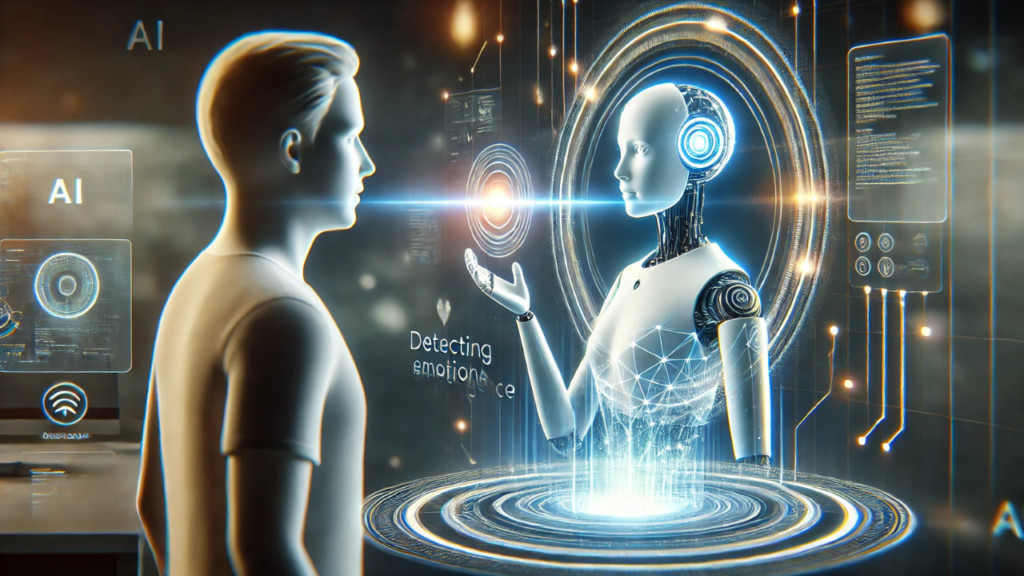Talkie Soulful AI: Revolutionizing Communication with Emotion and Empathy

In an era when artificial intelligence (AI) is becoming deeply embedded in our daily lives, we interact with AI-powered tools in various capacities. But what if AI could not only understand our words but also detect and respond to our emotions? Enter Talkie Soulful AI, a groundbreaking technology that is reshaping communication by adding emotional intelligence to artificial interactions.
This article explores the inner workings of Talkie Soulful AI, its vast applications across different industries, the ethical challenges it presents, and its potential future impact. Let’s dive into how Talkie Soulful AI is revolutionizing the way we communicate with machines and one another.
The Technology Behind Talkie Soulful AI
At the core of Talkie Soulful AI lies cutting-edge technology that integrates natural language processing (NLP), emotion detection, and machine learning. NLP is a form of AI that helps machines understand, interpret, and generate human language. In a typical AI system, the machine would respond based purely on logical structures, rules, or algorithms. However, Talkie Soulful AI goes a step further by adding a layer of emotional intelligence.
Emotion detection and response generation are crucial features of this technology. Talkie Soulful AI can analyze speech patterns, tone, pace, and pauses to detect underlying emotions like happiness, sadness, frustration, or excitement. It doesn’t stop at identifying emotions; it can also respond empathetically, adapting its tone and language to match the emotional context. For example, if a user speaks to an AI agent with a frustrated tone, Talkie Soulful AI might respond calmly and reassuringly, acknowledging the user’s feelings.
Machine learning plays a vital role in continuously improving the system. Through deep learning algorithms, Talkie Soulful AI becomes more adept at understanding human emotions over time. Analyzing massive data sets of emotional interactions, it learns to refine its responses, making them more accurate and contextually relevant. This means that the AI can learn from each interaction, further enhancing its emotional depth and empathy.
Applications of Talkie Soulful AI in Various Industries

Healthcare
Talkie Soulful AI holds tremendous potential in the healthcare sector, especially in mental health. Virtual assistants powered by this AI can detect emotional cues in conversations, making them ideal for therapy or mental health support applications. AI-based chatbots and virtual counselors can engage with patients, assess their emotional states, and provide empathetic responses or recommend coping strategies. These AI-powered agents are available 24/7, offering support when human therapists may not be immediately available.
Talkie Soulful AI can also assist in managing chronic illnesses by providing emotional support to patients during their treatment journeys. For example, virtual nurses could offer encouragement, remind patients to take medication or provide positive reinforcement during rehabilitation. The ability to recognize a patient’s emotional state and adjust communication accordingly makes Talkie Soulful AI a powerful tool for improving the overall patient experience.
Customer Service
Customer service is another field that benefits significantly from implementing Talkie Soulful AI. AI-powered customer service agents are commonly used in chatbots or voice assistants to handle customer inquiries. Talkie Soulful AI enhances these systems by making the interactions more human-like. For instance, if a customer is upset or dissatisfied with a service, the AI can identify the emotion and respond with empathy, offering solutions reassuringly. This improves the customer experience and fosters a stronger emotional connection between the customer and the brand.
Another benefit is that these emotionally intelligent agents can reduce burnout among human customer service representatives. When AI can handle routine, emotionally intense interactions, employees can focus on more complex tasks, preventing stress and maintaining high-quality service standards.
Education
Talkie Soulful AI can also revolutionize the way students learn. Imagine AI tutors that can assess a student’s emotional state and adjust the teaching method accordingly. If a student is frustrated with a particular concept, the AI might simplify explanations or provide encouraging words to reduce stress. On the other hand, if a student is excited about learning, the AI can engage more actively, reinforcing the enthusiasm with positive reinforcement.
Emotionally intelligent AI in education could also help students manage their emotions during exam preparations. For example, an AI study buddy might recognize signs of anxiety and provide techniques for relaxation or even offer motivational words to boost confidence.
Entertainment
The entertainment industry stands to benefit immensely from Talkie Soulful AI. From interactive video games to virtual reality experiences, AI characters that respond to emotional cues can enhance immersion. In gaming, players can engage with virtual characters that adapt their behavior based on the player’s emotional state, offering deeper storytelling and more meaningful interactions.
Moreover, AI-powered companions designed for personal entertainment can simulate emotional responses, offering companionship and conversation. Whether it’s a virtual pet or an AI-based social companion, the emotional engagement created by Talkie Soulful AI can make these experiences feel more real and fulfilling.
Ethical Considerations and Challenges in Developing Soulful AI
While Talkie Soulful AI has immense potential benefits, developing emotionally intelligent AI systems raises ethical concerns. Privacy is one of the most significant issues. For Talkie Soulful AI to accurately detect emotions, it must analyze sensitive data such as speech tone, facial expressions, and other personal cues. This raises questions about data security and the ethics of collecting and using emotional data without explicit consent.
Another challenge is the issue of bias. AI systems learn from data, and if that data isn’t representative of all emotional nuances across cultures and demographics, the system may misinterpret emotions or provide biased responses. For example, certain emotional expressions might be misread depending on the user’s cultural background, leading to incorrect or insensitive responses.
Finally, there’s the question of emotional boundaries between humans and AI. How much emotional engagement should AI be allowed to provide? Over-reliance on AI for emotional support could lead to isolation, where people substitute AI interactions for genuine human connections. Striking the right balance is essential to ensure that AI enhances human interactions without replacing them.
The Future of Talkie Soulful AI
The future of Talkie Soulful AI is exciting, with ongoing advancements pushing the boundaries of emotional intelligence. As AI systems evolve, we can expect more nuanced and complex emotional responses from virtual assistants. With more profound learning algorithms and better integration with other technologies like augmented reality (AR) and virtual reality (VR), Talkie Soulful AI will be able to engage users in even more immersive and emotionally enriching experiences.
Integration with emerging technologies such as autonomous vehicles could also introduce new opportunities. For instance, self-driving cars powered by Talkie Soulful AI could ensure safety and provide emotional support to passengers, helping them feel more comfortable during their ride.
In the long run, Talkie Soulful AI will play a pivotal role in shaping human-AI relationships. Its ability to understand and respond to emotions in real-time will profoundly impact industries like healthcare, customer service, and entertainment, improving human well-being and making AI interactions more natural and meaningful.
Conclusion
Talkie Soulful AI sets the stage for a new era of human-computer interactions, where emotional intelligence is at the forefront. By leveraging advanced technologies such as NLP, emotion detection, and machine learning, Talkie Soulful AI is transforming industries like healthcare, customer service, education, and entertainment. However, it also brings forth ethical challenges, such as privacy concerns and the risk of bias, which must be addressed as technology evolves.
As AI becomes more emotionally aware, it will enhance human interactions, offering empathy and understanding in ways we’ve never experienced before. While there is still much to learn and explore, the future of Talkie Soulful AI holds immense potential for improving our daily lives and reshaping how we communicate with machines.
Frequently Asked Questions (FAQs)
What makes Talkie Soulful AI different from other AI communication systems? Talkie Soulful AI stands out by incorporating emotional intelligence, enabling it to understand and respond to human emotions.
How does Talkie Soulful AI detect emotions during interactions? The AI uses advanced algorithms to analyze speech tone, pace, and context to detect underlying emotions such as happiness, anger, or sadness.
Can Talkie Soulful AI be used for therapy or mental health support? Yes, Talkie Soulful AI can be used in mental health applications, providing emotional support, offering therapy-like interactions, and assisting patients in managing stress and anxiety.
What are the privacy risks associated with Talkie Soulful AI? Since the AI analyzes emotional data, privacy concerns exist regarding collecting, storing, and using sensitive emotional data.
How do companies ensure that Talkie Soulful AI remains unbiased in recognizing emotions? Companies must use diverse and representative datasets to train AI models to avoid cultural and demographic bias in emotion detection.
Will AI eventually replace human emotional connections? While AI can enhance communication, it is unlikely to replace the depth of genuine human emotional connections. AI should complement, not substitute, human interactions.
How can Talkie Soulful AI improve customer service experiences? By providing empathetic responses and understanding customers’ emotional states, Talkie Soulful AI can enhance customer satisfaction and loyalty.
What challenges does Talkie Soulful AI face in various industries? Challenges include overcoming bias, ensuring data privacy, and addressing concerns about the impact of AI on human relationships.
Can Talkie Soulful AI be integrated with virtual assistants like Alexa or Siri? It can enhance existing virtual assistants by adding emotional intelligence, making them more responsive to user emotions.
How does the future of Talkie Soulful AI impact our daily lives? Talkie Soulful AI will improve everyday interactions by offering more empathetic communication, enhancing customer service, and providing emotional support in various fields.
You May Also Read: https://bestusatime.com/pooh-shiesty-height/



